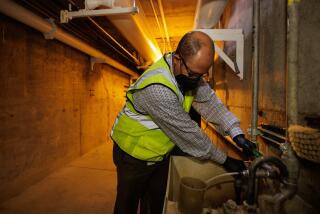Meese Calls for Mandatory Drug Tests in Arrests
- Share via
WASHINGTON — Atty. Gen. Edwin Meese III, signaling the Administration’s increasing frustration over its inability to solve the drug crisis by keeping illicit narcotics out of the country, Tuesday proposed mandatory drug testing for all who are arrested for any crime.
“I would like to see the day where every person arrested is subjected to a urine test,” Meese told the police policy board of the U.S. Conference of Mayors.
Meese later told reporters that the testing for arrested persons “is part of our user accountability strategy that is being developed at the present time.”
User Accountability
The National Drug Policy Board, an interagency coordinating group that Meese heads, is emphasizing “user accountability” in a national anti-drug strategy it is developing for the federal government. The board’s report is expected to be issued shortly.
Although someone testing positive would not automatically be charged with a drug offense, he could be denied bail in the case against him or forced to receive anti-drug treatment.
Subjecting those arrested to mandatory drug tests would recognize that “the user is not a victim, as some would suggest, but rather . . . is a vital participant in drug trafficking,” Meese said.
The attorney general said “no” when asked if he thought the testing would raise any constitutional problems.
Judge Reviewing Issues
Actually, constitutional issues raised by pretrial drug testing are currently under review by a federal judge at the direction of the U.S. Circuit Court of Appeals in the District of Columbia.
Last November, the appeals court ordered U.S. District Judge Barrington D. Parker to reconsider a 1985 ruling in which he rejected a legal challenge by a man who was granted bond on condition that he submit to drug tests and treatment. The man was jailed when he failed to show up for the tests.
The appeals court found that Parker had failed to “consider significant constitutional issues” raised by the district’s drug testing program and directed him to review the matter.
Legal analysts have questioned whether mandatory drug tests violate the Fourth Amendment’s prohibition against “unreasonable” searches. But the appeals panel noted that the court record was “virtually barren” on the issue of whether the tests would be a violation.
Drug Use Study Cited
Meese cited evidence showing the link between drug use and crime. A study sponsored by the National Institute of Justice, the Justice Department’s research arm, employed voluntary testing of arrested persons and produced “amazing results,” he said.
The program, conducted in 12 cities including Los Angeles and San Diego, found that from 53% to 79% of men arrested for serious offenses tested positive for illicit drugs. Under the program, more than 2,000 persons arrested between last June and November were given urine tests.
“Overwhelming evidence now exists that links drug use to criminal activity,” Meese said in announcing the study’s results last Jan. 21.
Meese’s advocacy of mandatory testing of arrested persons is the latest indication that the Administration is convinced that a far-reaching, multi-pronged program attacking the drug problem on both the demand and supply sides represents the best chance of a long-term solution.
The chief advocate of “user accountability” on the drug policy board has been Dr. Ian MacDonald, President Reagan’s drug adviser.
Passport Seizure Lauded
MacDonald, in a recent interview, cited favorably the U.S. Custom Service’s policy of seizing passports of citizens found to be entering the country with any amount of illegal drugs and New Jersey’s practice of suspending for a year the driver’s license of a minor found with drugs in his possession.
One of the problems with previous anti-drug efforts, he contended, is that authorities “never went after the users.”
At the mayors’ conference, Meese heard criticism about the federal anti-drug effort from three Democratic mayors--Joseph Paolino of Providence, R.I.; Sidney J. Barthelemy of New Orleans and Joseph S. Daddona of Allentown, Pa.
“The problem just keeps on getting bigger,” Paolino said, according to the Associated Press. “We’re going around in circles” in trying to curb drug supplies.
Meese, asked about the mayors’ comments, after his session with them, said: “I haven’t heard any lack of confidence. As a matter of fact, all I heard was a great deal of support.”
More to Read
Sign up for Essential California
The most important California stories and recommendations in your inbox every morning.
You may occasionally receive promotional content from the Los Angeles Times.












